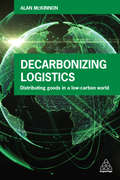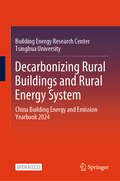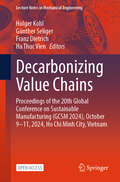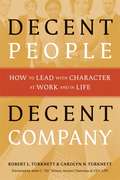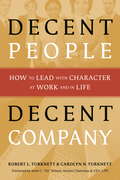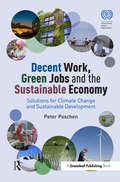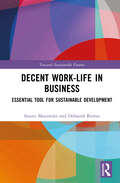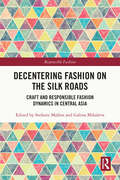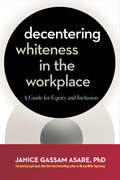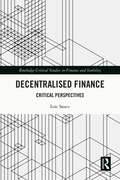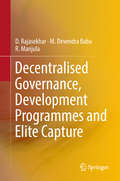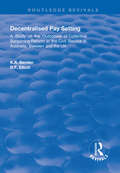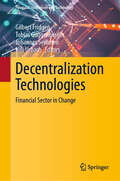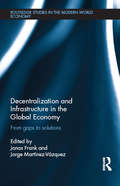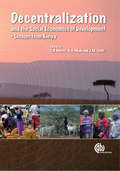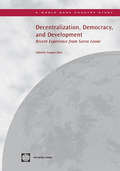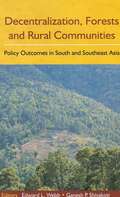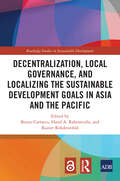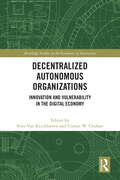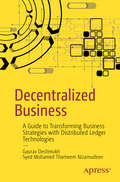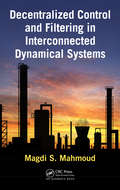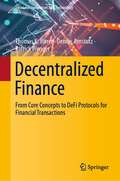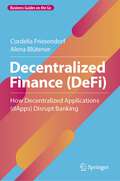- Table View
- List View
Decarbonizing German Family Firms (Familienunternehmen und KMU)
by Gunther FriedlIn this Open Access Publication, we present four chapters that provide a holistic view of the critical steps in a family firm&’s decarbonization journey. Achieving the EU's climate targets relies heavily on German family firms, given their pivotal role in the economy and substantial greenhouse gas (GHG) emissions. First, we explore the measurement and accounting mechanisms of GHG emissions, leveraging data from German family firms across various industries. Second, we examine the management of goal tensions between environmental and economic objectives, focusing on how family firms can derive value from their emissions data. Third, with the upcoming Corporate Sustainability Reporting Directive (CSRD) and the importance of communicating decarbonization efforts to stakeholders, we analyze the implications of this reporting mandate for family firms. Fourth, given the high investment demands of decarbonization measures, profitability remains a critical concern. Therefore, we also delve into the relationship between corporate environmental performance and corporate financial performance, highlighting the intersection of sustainability and long-term financial viability.
Decarbonizing Logistics: Distributing Goods in a Low Carbon World
by Prof Alan McKinnonLogistics accounts for around 9-10% of global CO2 emissions and will be one of the hardest economic sectors to decarbonize. This is partly because the demand for freight transport is expected to rise sharply over the next few decades, but also because it relies very heavily on fossil fuel. This book outlines the nature and extent of the challenge we face in trying to achieve deep reductions in greenhouse gas emissions from logistical activities. It makes a detailed assessment of the available options, including restructuring supply chains, shifting freight to lower carbon transport modes and transforming energy use in the logistics sector. The options are examined from technological and managerial standpoints for all the main freight transport modes.Based on an up-to-date review of almost 600 publications and containing new analytical frameworks and research results, this book is the first to provide a global, multi-disciplinary perspective on the subject. It is written by one of the foremost specialists in the field who has spent many years researching the links between logistics and climate change and been an adviser to governments, international organizations and companies on the topic.
Decarbonizing Rural Buildings and Rural Energy System: China Building Energy and Emission Yearbook 2024
by Building Energy Tsinghua UniversityThis open access book focuses on China’s building energy consumption and CO2 emissions, to discuss the status quo of China’s building energy in four categories, their characteristics and technologies to improve energy efficiency and achieve zero-carbon emission. Carbon peaking and carbon neutrality targets have been one of the main motivations and goals for China’s social and economic development. Building is one of the most important sectors to achieve energy saving and emission reduction. In particular, this book discusses the pathways to achieve the carbon neutrality target for China’s rural buildings and rural energy system. This book analyzes the energy system transformation, technology perspectives to implement energy and carbon target in rural building sector. This book consists of large scale of survey data, monitoring data, and case studies. The discussion on technologies and policies is supported by a variety of evidences and continuous research for more than ten years. The information, data, and policy suggestions will be of interest to national and international audiences working in the fields of energy, climate change, engineering, and building science areas.
Decarbonizing Value Chains: Proceedings of the 20th Global Conference on Sustainable Manufacturing (GCSM 2024), October 9–11, 2024, Ho Chi Minh City, Vietnam (Lecture Notes in Mechanical Engineering)
by Holger Kohl Günther Seliger Franz Dietrich Ha Thuc VienThis is an open access book. It gathers the proceedings of the 20th Global Conference on Sustainable Manufacturing, held on October 9–11, 2024, in Binh Duong and Ho Chi Minh City, Vietnam. With a focus on sustainable manufacturing strategies for decarbonizing supply chains, the chapters selected for this book report on models applied to, and results achieved in the mobility, energy, and construction sector, covering both aspects of digitalization and the combined application of circular economy and artificial intelligence. Moreover, they discuss energy-efficient process, reassembly and reuse, and CO2 neutral production, giving a special emphasis to developing sustainable manufacturing in South-East Asia. This book offers extensive and timely information for both researchers and professionals in the field of manufacturing and business development.
Decent People, Decent Company: How to Lead with Character at Work and in Life
by Robert L. Turknett Carolyn N. Turknett Kent C. NelsonThe inspiring people who lead with integrity, move things forward, garner commitment from others and are willing to ask the tough questions when necessary are the real leaders who generate and sustain cultures of character in organizations. Decent People, Decent Company puts the power to develop the core qualities of leadership character into the hands of anyone dedicated to bringing integrity, respect and personal responsibility back to the workplace. Drawing on more than 25 years of experience working with hundreds of CEOs, managers and teams, this innovative husband-and-wife team provides both the inspiration and the tools to help people move from asking "Why don't they?" to asking "What can I?" With their original and dynamic Leadership Character Model, the Turknetts have captured the essence of what it takes to revitalize attitudes and behavior, unleash leadership integrity and reinvigorate organizations. Decent People, Decent Company identifies the eight essential traits of leadership character: empathy, emotional mastery, lack of blame, humility, accountability, courage, self-confidence and focus on the whole. In chapters that focus on each quality, dozens of leaders bring to life the struggles and triumphs of developing the behaviors of character and ethical leadership required to bring out the best in everyone.
Decent People, Decent Company: How to Lead with Character at Work and in Life
by Robert L. Turknett Carolyn N. TurknettInspiring people who lead with integrity move things forward, garner commitment from others, and are willing to ask the tough questions when necessary. These are the real leaders who generate and sustain cultures of character in organizations. Decent People, Decent Company now puts the power to develop the core qualities of leadership character into the hands of anyone dedicated to bringing integrity, respect, and personal responsibility back to the workplace - regardless of their place in the organization. Drawing on more than 25 years experience working with hundreds of CEO, managers, and teams, this innovative husband and wife team provide both the inspiration and the tools to help people move from asking "Why don't they?" to asking "What can I?" With their original and dynamic Leadership Character Model, the Turknetts have captured the essence of what it takes to revitalize attitudes and behavior, unleash leadership integrity, and reinvigorate organizations. Decent People, Decent Company identifies the eight essential traits of leadership character: empathy, emotional mastery, lack of blame, humility, accountability, courage, self-confidence, and focus on the whole. In chapters that focus on each quality individually, dozens of leaders, in their own words, bring to life the struggles and triumphs of developing the behaviours of character and ethical leadership required to bring out the best in everyone.
Decent Work
by Narayan Prasad Nausheen Nizami'Decent Work' is a concept developed by the International Labour Organisation that sums up the aspirations of people in work life. This book provides a consolidated and encompassing guide to the underlying philosophy, meaning and theory of the decent work paradigm. It also provides an empirical analysis of the current status of decent work in the Information Technology (IT) industry of India adopting a pragmatic approach towards the measurement of decent work. One of the purposes of this study is to unfold different dimensions of decent work and counter the general perceptions about work conditions in the IT industry. Surprisingly, work was not found to be decent for a majority of Indian IT employees on various indicators. The key features of this book are: a thorough conceptual coverage; rich literature review; cross-examination of decent work indicators in the context of India's IT industry; construction of Decent Work Index (DWI) at the micro-level; indices for each decent work indicator; primary data based on questionnaire responses; and detailed discussion on the implications of deficiency of decent work in India in general and the IT industry in particular.
Decent Work, Green Jobs and the Sustainable Economy: Solutions for Climate Change and Sustainable Development
by Peter PoschenThe challenges of achieving environmental sustainability and of generating decent work for all are closely linked. In this timely book, Poschen argues that an integrated approach to tackle these challenges is a necessity: the goal of environmentally sustainable economies will not be attained without the active contribution of the world of work. Decent Work, Green Jobs and the Sustainable Economy demonstrates that green jobs can be a key economic driver, as the world steps into the largely uncharted territory of building a sustainable and low-carbon global economy. Poschen shows that positive outcomes are possible, but require a clear understanding of the opportunities and challenges.Enterprises, workers and governments are not passive bystanders in the great transformation that is urgently needed in our economies. They are essential agents of change, able to develop new ways of working in sustainable enterprises that safeguard the environment, create decent jobs and foster social inclusion. This book highlights the solutions that the world of work offers for policy and practice to tackle climate change, achieve environmental sustainability and to build prosperous and cohesive societies. It is essential reading for those in business, academia and government.
Decent Work-Life in Business: Essential Tool for Sustainable Development (Towards Sustainable Futures)
by Debasish Biswas Soumi MajumderDecent Work-Life in Business: Essential Tool for Sustainable Development presents a detailed discussion of the concept of decent work-life and its application in business for sustainable development. It discusses decent work-life culture in a business environment. The book makes a strong case for decent work, which not only provides work opportunities but also delivers a fair income, fair treatment, security at the workplace, and social protection for families. With the help of empirical data and statistical indicators, it explores themes such as: ILO and decent work agenda opportunities for work and dignity at work social dimensions of globalization and sustainable development poverty reduction through decent work work-life balance and social protection unacceptable work and social dialogue economic and social context of decent work This book will be an indispensable resource for the students, scholars and teachers of business management and especially those pursuing a career in human resource management. It will also interest scholars of political economy, sociology of work, business management, human resource management, labour studies, public policy, and social anthropology alongside industry experts.
Decentering Fashion on the Silk Roads: Craft and Responsible Fashion Dynamics in Central Asia (Responsible Fashion)
by Stefanie Mallon Galina MihalevaDecentering Fashion on the Silk Roads focuses on the dynamism of fashion, textile craft, heritage, and sustainability in Central Asia and beyond. The compelling series of accounts provides a comprehensive set of insights and impressions collected from both fashion academics, designers and practitioners from around the globe who journeyed through Uzbekistan and Kazakhstan and from those who live and work in this region. It showcases ways in which local textile craft practices can inform the modern fashion industry into becoming more sustainable.The book opens by exploring the importance of the old ‘Silk Roads’ crossing through the heart of the world in Central Asia, serving not only as trade routes but also allowing knowledge, art, and practices to be transmitted between the Orient and the Occident – enabling ideas to flourish and cultural dispositions to develop from Antiquity until Modernity. The unique set of chapters that follow examine and highlight the growing opportunities and lessons this region has to offer to Western fashion through local artistry and craft, and points toward the urgent need to slow down and adopt responsible principles and practices. The book constitutes a warm appreciation of the experiences and grateful thanks to the many communities from all different backgrounds and ages who contributed.This rich travelogue is a refreshing resource for international scholars and postgraduate students studying and researching fashion theory and management in particular. It will also be of interest to anthropologists, cultural studies, and textiles scholars.
Decentering Whiteness in the Workplace: A Guide for Equity and Inclusion
by Janice Gassam AsareYour DEIJ efforts are stagnating because you continue to center whiteness. Creating a truly anti-racist organization requires learning how to identify and rectify the systemic, and often unconscious, centering of white culture and values in the workplace.Corporate America continues to struggle with racial equity in a post-George Floyd world. As the United States becomes more diverse and the public consciousness continues to shift, successful racial equity efforts in the workplace are needed now more than ever. Decentering Whiteness in the Workplace exposes the ways that white culture and expectations are centered in the modern American workplace and the fears within corporate spaces about talking candidly, openly, and honestly about whiteness, white supremacy, and anti-Blackness.Readers will discover: A direct and straightforward analysis about what white-centering is An evaluation of the different ways that whiteness is centered in the workplace, such as bereavement and holiday policies and dress codes A guide on how to recognize and decenter whiteness within oneself and at work Solutions for people to contribute individually and systemically to anti-oppressionDecentering Whiteness in the Workplace provides a crucial guidebook with practical solutions for leaders, DEIJ practitioners, and anyone hoping to truly create an anti-racist workplace.
Decentralised Finance: Critical Perspectives (Routledge Critical Studies in Finance and Stability)
by Loïc SauceSince the inception of Bitcoin in 2009, cryptoassets and decentralised finance (DeFi) have become a multi-trillion-dollar industry, with a growing number of users, entrepreneurs, investment funds and institutional investors all over the world. This has led to understandably high levels of attention from scholars, the media, and policymakers, but much of the writing on decentralised finance is polarised or polemical.In contrast, this book provides a balanced, scholarly and sober assessment of broad questions about the very existence and purposes of decentralised finance. Drawing largely on the Austrian school of economics, particularly the ideas of Hayek and Lachmann, the book explores the stated aims of proponents of decentralised finance, particularly the goals of having decentralised governance and financial inclusion in an anonymous environment with low entry and exit barriers. Prioritising the theoretical and political aspects of decentralised finance over the financial or technological, the book considers whether these aims are realistic and whether decentralised finance can complement or substitute traditional financial mechanisms ('TradFi').This book will be of valuable reading for economists, political scientists and policymakers, who are engaging with these key issues around cryptocurrencies and decentralised finance.
Decentralised Governance, Development Programmes and Elite Capture
by D. Rajasekhar M. Devendra Babu R. ManjulaThis book discusses the elite capture taking place in the development programmes implemented through Grama Panchayats (GPs), the lowest tier in the rural local self-government structure in India. Inclusive growth being the cherished goal of all the developing countries, including India, the book assesses whether checks and balances incorporated in development programmes prevent elite capture and promote inclusive development. It also highlights the role of community-based organisations, such as SHGs, in ensuring development benefits reach marginalized groups. The policy makers in India introduced decentralised governance to facilitate the participation of marginalized groups in the planning and implementation of development programmes at the local level, and to ensure that development benefits reach them. International agreements such as the Hyogo Framework for Action, Millennium Development Goals and Sustainable Development Goals also call for decentralised governance for inclusive growth. The issue of elite capture has traditionally been studied mainly from the sociological perspective, i.e., how the local upper/dominant castes and classes garner the positions and benefits. But with the new and structured governance system that is in place at the local level in contemporary India, this book explores how decentralised governance is addressing the issue of elite capture. The study closely analyses micro processes of decentralisation to understand how elite capture is taking place. Additionally, it examines this concern from both governance and economic perspectives. The scope of the book is wide, and encompasses several aspects such as the functioning of the local government, decentralised governance, checks and balances in development programmes, community-based organisations, the upward political linkages and elite capture. It is equally relevant to researchers from several social science disciplines, civil society, policy makers, and implementers from the grassroots to national level government.
Decentralised Pay Setting: A Study of the Outcomes of Collective Bargaining Reform in the Civil Service in Australia, Sweden and the UK
by K. A. Bender R. F. ElliottIThis title was first published in 2003. In the early 1990s, Australia, Sweden and the UK dismantled the old centralised pay setting systems which set the pay of civil servants and adopted decentralised pay systems. Consequently, these systems are now being considered by many other European countries as they look to reform their own systems. Bender and Elliott analyse the outcomes of these pioneering reforms in all three countries and, in doing so, provide the most detailed analysis of the pay of civil servants in these three countries to date. The authors further assess the effect that decentralisation had on the inequality of pay both within and between different departments, agencies and ministries. They identify the differences in the rates of pay growth for the different grades of civil servants that lie behind the changes in pay inequality, and assess whether decentralisation changed the way in which civil servants are paid.
Decentralization Technologies: Financial Sector in Change (Financial Innovation and Technology)
by Nils Urbach Gilbert Fridgen Tobias Guggenberger Johannes SedlmeirThis book connects decentralization technologies with the world of finance and financial services. Increasingly, the financial sector is data-driven, with tensions arising between technical innovations and regulators’ and consumers’ expectations. Fundamentally, financial markets are competitive data markets. The authors of this edited book first identify where changes in the regulatory and business regime give rise to novel requirements and needs for these data markets. Next, the authors introduce three key decentralization technologies –decentralized digital identities, distributed ledger technologies, and federated learning. They discuss privacy-enhancing technologies such as zero-knowledge proofs and illustrate the demands of practical applications. The authors further provide explicit application examples to illustrate where and how these decentralization technologies allow to reflect business, customer, and regulatory requirements amid competitive markets. The volume concludes with an outlook on governance and the sustainability implications of decentralization.
Decentralization and Infrastructure in the Global Economy: From Gaps to Solutions (Routledge Studies in the Modern World Economy)
by Jonas FrankThe subnational dimension of infrastructure has emerged as one of the greatest challenges in contemporary public finance policy and management. Ensuring the efficient provision of infrastructure represents a challenge for all countries irrespective of their level of centralization or decentralization. This book proposes an innovative approach for the strengthening of decentralized public investment and infrastructure management. Decentralization and Infrastructure in the Global Economy: From Gaps to Solutions covers the most important aspects of infrastructure investment in a decentralized setting. It discusses infrastructure gaps and the quality of subnational spending; how functional responsibilities, financing and equalization can be designed; sector-specific arrangements in high expenditure areas, such as health, education and roads; key steps of the public investment cycle and management; and analyses the political economy and corruption challenges that typically accompany decentralized infrastructure projects. This book challenges some of the well-accepted principles of intergovernmental fiscal relations and will be useful to researchers and practitioners of public finance policy and management.
Decentralization and the Social Economics of Development: Lessons from Kenya
by Christopher B. Barrett Andrew G. Mude John M. OmitiBarrett (applied economics and management, Cornell U. , US), Mude (International Livestock Research Institute, Kenya), and Omiti (Kenya Institute of Public Policy Research and Analysis, Kenya) present research conducted under the auspices of the Strategies and Analysis for Growth and Access project, a USAID funded program cooperatively directed by Cornell and Clark Atlanta Universities. The specific subject of the research presented here concerns the effect of various forms of decentralization on rural development, individual and group empowerment, and rural well-being in Kenya, as well as the institutional correlates of successful and unsuccessful decentralization efforts.
Decentralization, Democracy, and Development: Recent Experience from Sierra Leone
by World BankThe question of whether political, fiscal, and administrative decentralization improves government effectiveness is hotly debated among researchers and policy makers. 'Decentralization, Democracy, and Development' contributes to the empirical literature on decentralization and the debate on whether it is a viable and desirable state-building strategy for post-conflict countries. This book is a collection of eight papers written by nine authors who were intimately involved in the complex decentralization reform process in Sierra Leone from 2003-07. During this period, Sierra Leone's government established elected district and urban councils across the country, transferred certain responsibilities for primary services and local investment and some financial resources to the new councils, and invested heavily in building the administrative infrastructure and capacity of the local councils. Compared to most other Sub-Saharan African countries that have embarked upon decentralization, Sierra Leone's progress in building local government capacity and restructuring the fiscal system is enviable. The authors conclude that improved security and public services are possible in a decentralizing country and Sierra Leone's progress would not have been possible without significant effort at fiscal decentralization and intensive investment in local government capacity building. The most critical ingredient for this promising but fragile reform process is the dynamic leadership team in charge of promoting the new institutional framework and their persistent effort to achieve quick improvement in the local government system and public services.
Decentralization, Forests and Rural Communities: Policy Outcomes in Southeast Asia
by EDWARD L. WEBB GANESH P. SHIVAKOTIAsian societies are entering a new era of decentralized governance of forests. The authority to make decisions on forest management has shifted to lower levels of government and, in some cases, to the local people themselves. But can governments simply `decentralize` authority away from the center, or are there certain core elements necessary to achieve sustainable management and conservation of forests in a decentralized world? This book argues that policy solutions to resource dilemmas faced by forest-accessing rural communities must be flexible, and should allow for local dynamics and innovations to take place. Presenting case studies from Bhutan, India, Indonesia, Nepal, Thailand and Vietnam, this volume investigates how decentralization is affecting local stakeholders and their management of forest resources.
Decentralization, Local Governance, and Localizing the Sustainable Development Goals in Asia and the Pacific (Routledge Studies in Sustainable Development)
by Bruno Carrasco, Hanif A. Rahemtulla, and Rainer RohdewohldSince its adoption in 2015, the 2030 Agenda on Sustainable Development has shaped not only international development cooperation but also the design of national trajectories for social and economic development. In tandem with other global agendas adopted that year (such as the Paris Agreement on Climate Change and UN Habitat’s New Urban Agenda) it remains the global and regional blueprint for sustainable development despite the COVID-19 pandemic. The term "localizing the Sustainable Development Goals (SDGs)" has been used to capture the importance of subnational governments for achieving national SDG agendas. However, there is little deeper analysis of the required nexus between fiscal, political, and legal arrangements for SNGs; their involvement in national policy arenas (which discuss and decide on national SDG strategies); and the need for locally disaggregated data systems on the one hand, and effective SDG localization strategies on the other hand. It is this aspect which the present publication explores in greater detail by using country examples and conceptual analyses. The text will be of interest to policymakers, scholars, students and practitioners in public policy and public administration, decentralization, and sustainable development, with a focus on the Asia and Pacific region. The Open Access version of this book, available at www.taylorfrancis.com, has been made available under a Creative Commons Attribution-Non-Commercial-No Derivative License (CC BY-NC-ND 3.0 IGO).
Decentralized Autonomous Organizations: Innovation and Vulnerability in the Digital Economy (Routledge Studies in the Economics of Innovation)
by Usman W. Chohan Sven Van KerckhovenDecentralized Autonomous Organizations (DAOs) constitute a comparatively novel area in academic research and scholarship, but the budding interest in this category of digital and algorithmic organization across various disciplines provides an indication of the possibilities that DAOs wield in terms of informing and advancing our understanding of the potentialities of the digital economy's forthcoming iterations. It also points towards practical use cases to solve problems that the increasing decentralization and amorphization of the structures of the digital economy portend. At the same time, DAOs are afflicted by various strands of skepticism that are attributable to their vulnerabilities, subjacent hype, ultimate purpose, and usefulness. This skepticism also requires scholarly attention and careful study through multidisciplinary perspectives, as further research may come to either dispel or confirm the array of concerns that continue to loom large about DAOs as technological, governance, societal, and economic instruments in the future.With all this in mind, the aim of this book is to offer multiple studied perspectives that explore DAOs from a variety of perspectives across several disciplinary prisms. It does not seek simply to weigh the balance of DAO's merits and demerits, but rather to conceive, appreciate, and discover various elements of ultimate import to DAOs over their future evolutionary course. Drawing upon the insights of interdisciplinary subject matter experts, this book allows for a holistic enquiry into the role, potential and limitations of DAOs. The book will thus be of interest to a multidisciplinary audience of scholars in organizational studies, computer science, economics, sociology of technology, philosophy, law, and the governance of innovation.
Decentralized Business: A Guide to Transforming Business Strategies with Distributed Ledger Technologies
by Gaurav Deshmukh Syed Mohamed Thameem NizamudeenEmbark on a journey to business evolution grounded in the real-world experiences and challenges faced by those at the forefront of the Web2 revolution. In a landscape where adaptability is paramount, this book is a guiding light amidst a sea of uncertainty. Crafted by seasoned Web2 professionals, it offers a unique perspective on transitioning from traditional cloud computing to decentralized technologies. Delving beyond theory, this book provides actionable insights and strategies to navigate the complexities of Distributed Ledger Technologies (DLTs). Rather than just discussing the implementation of DLTs, it explores the intricacies of execution, offering tangible guidance to facilitate a seamless transition to the decentralized landscape. Moreover, this book doesn't stop at transition—it's a blueprint for thriving in the Web3 era. By offering strategic perspectives and tactical advice, it equips businesses of all sizes to not only survive but flourish in the decentralized economy. Whether you're a startup poised for disruption or an established enterprise seeking innovation, 'Decentralized Business' empowers you to confidently embrace the future. The time for passive observation is over; the future of business is decentralized, and Decentralized Business is your guide to navigating this evolution. Join the ranks of forward-thinkers shaping tomorrow's economy—secure your copy now and begin the journey of transformation and opportunity. What You Will Learn Understand the foundational concepts of DLTs and their relevance to Web2 professionals. Review security considerations and best practices for implementing decentralized solutions. Apply strategies for integrating DLTs into existing cloud-based infrastructures. Who This Book Is For IT managers and executives looking to explore the potential of decentralized solutions; technology consultants advising businesses on digital transformation and cloud-based strategies; professionals and architects are seeking to expand their knowledge into the realm of DLTs
Decentralized Control and Filtering in Interconnected Dynamical Systems
by Magdi S. MahmoudBased on the many approaches available for dealing with large-scale systems (LSS), Decentralized Control and Filtering in Interconnected Dynamical Systems supplies a rigorous framework for studying the analysis, stability, and control problems of LSS. Providing an overall assessment of LSS theories, it addresses model order reduction, parametric un
Decentralized Finance: From Core Concepts to DeFi Protocols for Financial Transactions (Financial Innovation and Technology)
by Thomas K. Birrer Dennis Amstutz Patrick WengerThis book addresses the main concepts of Decentralized Finance (DeFi) and the well-known economic problem of inflation within traditional financial systems (TradFi). The authors discuss how both systems are connected and describe how they influence each other. Furthermore, new technological developments in the finance sector are considered and explained. The book provides not only a theoretical background to understand how money has evolved over time but also many practical cases and advise to navigate the digital money era. While digitalization and innovation are evolving rapidly, this book aims to be time-independent in its content and in its focus on concepts. The book appeals not only to an academic audience but also to professionals working in the field.
Decentralized Finance: How Decentralized Applications (dApps) Disrupt Banking (Business Guides on the Go)
by Cordelia Friesendorf Alena BlütenerThis book explores how decentralized finance (DeFi) can disrupt traditional centralized finance including the business areas of insurance companies, banks, money markets, and bonds. DeFi is not a company or a single product, rather it is a collection of products or services. As part of the Ethereum ecosystem, DeFi services are provided as Decentralized Applications (dApps), which require smart contracts to lock in assets for processing transactions. Changing consumer expectations, the availability of affordable technologies, and entrepreneurial drive create space for DeFi. Geopolitical crises and trust deterioration exacerbate the need. This book explains the concept of DeFi, the technological opportunities, the current reality and status quo of business transactions, and demonstrates the potential for future use and the eventual transformation of the financial industry. It further provides a comprehensive analysis of the real-world applications of DeFi, the Decentralized Ledger Technology (DLT), and digital assets, as well as their potential risks to consumers and financial institutions to bankers, managers, investors, and policymakers.

